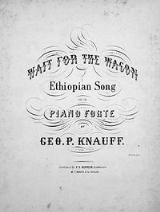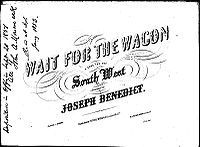
Wait for the Wagon
Encyclopedia
"Wait for the Wagon" is an American folk song, first popularized in the early 1850s.
"Wait for the Wagon" was first published as a parlor song in New Orleans, Louisiana
, with an 1850 copyright, and music attributed to Wiesenthal and the lyrics to "a lady". All subsequent versions seem to derive from this song.
Along the Mississippi River, most were nearly identical to the 1850 publication. Peters, Webb and Co. in Louisville, Kentucky, published it as "Wait For The Wagon: A Song For The South West" with no attribution to music or lyrics.
 On the east coast several versions were published as minstrel songs with slightly different lyrics and differently arranged music. One was published in May 1851 ("Wait For The Wagon: Ethiopian Song") in Baltimore, Maryland, and it was attributed to George P. Knauff. It is agreed upon that R. Bishop Buckley (1810 - 1867) probably first performed the song and Knauff arranged it as a composition. Knauff was a music teacher in Virginia
On the east coast several versions were published as minstrel songs with slightly different lyrics and differently arranged music. One was published in May 1851 ("Wait For The Wagon: Ethiopian Song") in Baltimore, Maryland, and it was attributed to George P. Knauff. It is agreed upon that R. Bishop Buckley (1810 - 1867) probably first performed the song and Knauff arranged it as a composition. Knauff was a music teacher in Virginia
, who compiled popular and folk fiddle tunes into a large compendium, Virginia Reels (1839). Buckley was born in England and came to America as a young man and, with his father and two brothers, formed the Buckley Serenaders. This minstrel show
toured America and Europe.
J.E. Boswell also published a minstrel version ("Wait For The Wagon: A New Ethiopian Song & Melody") in 1851, as arranged by W. Loftin Hargrave.
Wait for the Wagon was also published in London
circa 1847 - 1869.
The song became a hit in the Eastern United States, and other minstrel troupes added it to their own performances. Through them, it spread to the South and West. It remained particularly popular in the Ozarks and Mississippi
through the Civil War.
This tune was also the Regimental March of the The Royal Corps of Transport, a part of the British Army formed in 1965 from The Royal Army Service Corps and elements of The Royal Engineers. The corps was amalgamated with several others to form The Royal Logistic Corps in 1993, and this tune was superseded by the march 'On Parade'.
The South West versions was popular enough that "Answer To Wait For The Wagon" was published in 1852, the first verse of which opens with:
"Wait for the Wagon" was first published as a parlor song in New Orleans, Louisiana
New Orleans, Louisiana
New Orleans is a major United States port and the largest city and metropolitan area in the state of Louisiana. The New Orleans metropolitan area has a population of 1,235,650 as of 2009, the 46th largest in the USA. The New Orleans – Metairie – Bogalusa combined statistical area has a population...
, with an 1850 copyright, and music attributed to Wiesenthal and the lyrics to "a lady". All subsequent versions seem to derive from this song.
History
A number of different versions were published the next year.Along the Mississippi River, most were nearly identical to the 1850 publication. Peters, Webb and Co. in Louisville, Kentucky, published it as "Wait For The Wagon: A Song For The South West" with no attribution to music or lyrics.

Virginia
The Commonwealth of Virginia , is a U.S. state on the Atlantic Coast of the Southern United States. Virginia is nicknamed the "Old Dominion" and sometimes the "Mother of Presidents" after the eight U.S. presidents born there...
, who compiled popular and folk fiddle tunes into a large compendium, Virginia Reels (1839). Buckley was born in England and came to America as a young man and, with his father and two brothers, formed the Buckley Serenaders. This minstrel show
Minstrel show
The minstrel show, or minstrelsy, was an American entertainment consisting of comic skits, variety acts, dancing, and music, performed by white people in blackface or, especially after the Civil War, black people in blackface....
toured America and Europe.
J.E. Boswell also published a minstrel version ("Wait For The Wagon: A New Ethiopian Song & Melody") in 1851, as arranged by W. Loftin Hargrave.
Wait for the Wagon was also published in London
London
London is the capital city of :England and the :United Kingdom, the largest metropolitan area in the United Kingdom, and the largest urban zone in the European Union by most measures. Located on the River Thames, London has been a major settlement for two millennia, its history going back to its...
circa 1847 - 1869.
The song became a hit in the Eastern United States, and other minstrel troupes added it to their own performances. Through them, it spread to the South and West. It remained particularly popular in the Ozarks and Mississippi
Mississippi
Mississippi is a U.S. state located in the Southern United States. Jackson is the state capital and largest city. The name of the state derives from the Mississippi River, which flows along its western boundary, whose name comes from the Ojibwe word misi-ziibi...
through the Civil War.
This tune was also the Regimental March of the The Royal Corps of Transport, a part of the British Army formed in 1965 from The Royal Army Service Corps and elements of The Royal Engineers. The corps was amalgamated with several others to form The Royal Logistic Corps in 1993, and this tune was superseded by the march 'On Parade'.
Comparison of original to minstrel lyrics
| A Song For The South West (1851) | Ethiopian Song (1851) |
(First verse)
|
(First verse)
|
The South West versions was popular enough that "Answer To Wait For The Wagon" was published in 1852, the first verse of which opens with:
- I thank you, Mister Jacob, but I'm not inclin'd to go,
- Your wagon is so clumsey, and your team so very slow.
External links
- http://www.pioneergirl.com/songs_waitwagon.htm"Wait for the Wagon" on pioneergirl.com

